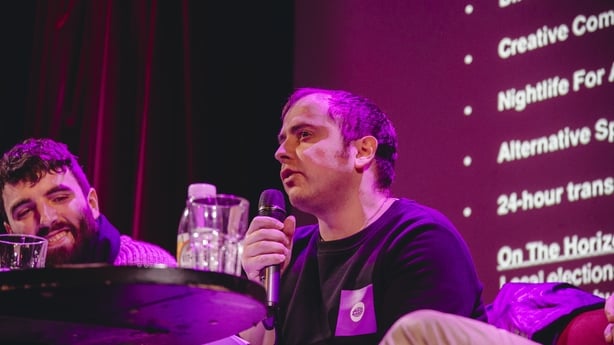The National Transport Authority (NTA) has increased taxi fares by 9% with the pre-booking fee also jumping from €2 to €3.
A special premium rate that normally applies during Christmas and New Year celebrations has also been extended to include weekend peaks throughout the year, on Friday and Saturday nights.
The extension of the premium rate is intended to encourage taxi drivers to take fares during busy night-time hours, times that drivers often avoid due to anti-social behaviour.
While the increases have been largely welcomed by the industry, some drivers say they are worried customers are already feeling the squeeze and thinking twice before booking a taxi.
Nightlife campaign group Give Us The Night and the Union of Students (USI) advised people who are feeling the pinch to split taxis in order to get home safely.
Its spokesperson Sunil Sharpe said that students on nights out, will be particularly affected by the changes.
“Our advice, if using taxis, is to plan your night out more in advance,” he said.
“Try to travel in groups of at least four if possible, especially if you have some distance to go.”
The National Maximum Taxi Fare Review is carried out by the NTA around every two years to ensure that taxi fares keep pace with changes in operating costs and to maintain the availability of taxi services around Ireland.
NTA Chief Executive Anne Graham said: “The NTA’s biennial review is essential to ensuring the taxi industry remains sustainable and can continue to offer high-quality and reliable services.
“This 9% increase provides for the increasing operational costs drivers are facing while balancing the needs of the travelling public,” she added.
Increase ‘needed to keep up with rising costs’
Dublin taxi driver Mick Keating said the increase, which came into effect last Saturday, was needed to keep up with rising costs.
“I think that we do deserve it because the price of petrol, diesel and all has gone up through the roof,” he said.
“Some people didn’t want an increase because they think it’s too expensive. All taxi drivers have a different opinion. Some love it. Some hate it.”
Mr Keating said that drivers had to get their meters updated before 1 December, a process that costs around €240.
He added that the new special premium rate for weekend nights should encourage drivers to work later hours.
“We are out there thick and thin.”
“It is helping the guys that might work until 10, 11 or 12. They might stay on.”
Mr Keating said that many drivers prefer to work during daylight hours when anti-social behaviour is less common.
He stressed the important role that taxi drivers play across Ireland, especially in the run-up to Christmas.
“When snow comes, when the buses and trains stop, everything stops bar the taxi man,” he said.
“We are out there thick and thin.”
The veteran driver called for more 24-hour public transport options, particularly during Christmas week so that all of the pressure is not on taxis.
“The Luas should be going 24 hours a day for the month of December,” he said.
Read more: 9% increase in taxi fares recommended by NTA
Taxi app FreeNow has welcomed the new increases, but said more measures are needed to support drivers.
“We have always supported this change,” said General Manager Danny O’Gorman. “It’s been a long time coming. A lot of things have increased for drivers.”
Mr O’Gorman said it is particularly expensive for drivers starting off, who now have to ensure that their taxis are accessible for wheelchair users.
“If you are a new driver entering the industry you have to get a wheelchair accessible vehicle and they are quite expensive,” he said.
Mr O’Gorman said government grants only go so far to help drivers meet this requirement.
“Drivers are staying away from those hours or not driving in certain areas because of the safety concern.”
Some taxi drivers are worried about the effect that the fare increase will have in typically quieter January and February, said Mr O’Gorman.
“It’s a bit too early to say how it will affect passengers,” he said.
Mr O’Gorman said that the special tariff at peak hours will increase the number of drivers on the road during weekend nights.
However, the company still has concerns about its drivers’ safety and well-being during those hours.
“That absolutely will increase supply at that time,” he said. “However, the fare increase in isolation is probably not enough.
“It will get a lot more drivers onto the road at that time but they are taking more risk in doing so.”
“We have asked for some safety concerns to be met.”
Mr O’Gorman said that drivers travelling through town on weekend nights can be at risk of violent behaviour.
“They are increasingly prone to attacks, to either racist abuse or to violent attacks,” he said.
“Drivers are staying away from those hours or not driving in certain areas because of the safety concern.”
FreeNow sent a manifesto to political parties ahead of the General Election, with most of the points focusing on its drivers’ safety.
Increasing taxi fares is not a solution – Uber
General Manager of Uber Ireland Kieran Harte said that the increase to taxi fares is not a solution to the industry’s problems.
“Increasing fares isn’t the solution to the supply problem the industry faces,” he said.
“Raising prices back in 2022 by 12% didn’t bring more drivers out to drive at weekends. We don’t think it will do the same this time either.”
Mr Harte said that customers are already feeling the squeeze and thinking twice before booking a taxi.
“We have concerns about people having second thoughts,” he said. “Already the worry of not being able to get home is having an impact.”
Uber is a member of the Taxis for Ireland Coalition which also includes the Local Vintners Association (LVA) and Restaurants Association of Ireland.
The coalition wants the next Government to increase the number of taxi drivers and vehicles on the road by at least 30% by 2027.
Mr Harte said that patrons of pubs and restaurants already opt for public transport alternatives when they can.
“Members say that a lot of patrons now will leave early to make sure they are on that last public transport home,” said Mr Harte.
“They are not staying for the last hour or two. Already, there’s a bit of a squeeze.”
He urged the NTA to help get more drivers and vehicles into the industry, to help with what he called a “supply crisis”.
This included looking at the local area knowledge test that drivers must sit to see if it is proportionate in “this day and age”.
Technology will now tell drivers the best way to get from A to B while acknowledging traffic jams, Mr Harte said.
Like Mr O’Gorman he stressed that the requirement for new vehicles to be wheelchair accessible, is discouraging potential drivers particularly those who might only drive at weekends.
However, he acknowledged the need for more wheelchair accessible vehicles.
“We would welcome the funding into wheelchair vehicles,” he said. “We are at a point where more than 20% of our taxis are wheelchair accessible which puts us right at the top across Europe.”
Safety is paramount for students – USI President
The President of USI encouraged students to travel in groups “to alleviate the cost somewhat”, but not to sacrifice safety when getting home from nights out.
“Drivers themselves are facing enough financial pressures. We are very aware of that,” said Chris Clifford.
“Instead of getting a taxi on your own, try and jump in with a couple of people.
“We want students to be safe. That’s something we always have in mind.
“We would encourage students, for the sake of the extra 9%, it’s better than taking a risk and walking home.”

Mr Clifford suggested that students use public transport for as much of their journey as they can before ordering a taxi for the last leg.
“Try and utilise public transport and then maybe get a taxi from there,” he said.
Meanwhile, Give Us The Night stressed that it was important not to “lay blame on the taxi industry” for rising costs.
“Like everything, costs are rising, wages are rising and taxi fares are now rising too,” said Mr Sharpe.
“They have reluctantly accepted fare increases in the past because they understand the need to keep fares competitive, but this time by and large, it’s seen as a necessity by most.”
Mr Sharpe said that the gap taxis fill during the night in counties around Ireland needs to be examined.
“Maybe it’s time to think more about the role of taxis in the picture of public transport, and how we use them at night.
“They provide a specialist service that should be there to mop up what regular public transport like bus and train can’t deliver.

“There are issues getting drivers to sign up to work at night too which may not be resolved anytime soon.
“This emphasises even more the need to improve our overall transport service at night. Dublin is now starting to make ground with 24-hour routes, and this Christmas’ Dublin Bus schedule is probably the best we’ve ever seen.
“This needs to spread though. Nightlife is for everyone, not just Dubliners.”
New generation of taxi drivers
FreeNow’s chief said it has seen a large increase of taxi drivers across the country during 2024, with Ireland boasting more taxi drivers per 1,000 people than its western European neighbours.
“In the first half of this year we saw a 24% increase in our supply – the amount of drivers available on FreeNow,” said Mr O’Gorman.
A large number of drivers have joined the industry since the Covid-19 pandemic, when retirements caused serious supply services.
“There is a huge new generation coming through,” said Mr O’Gorman. “We have seen a 7% increase in drivers since 2021.
“At the moment we have over 27,000 drivers with taxi driver licences.”
